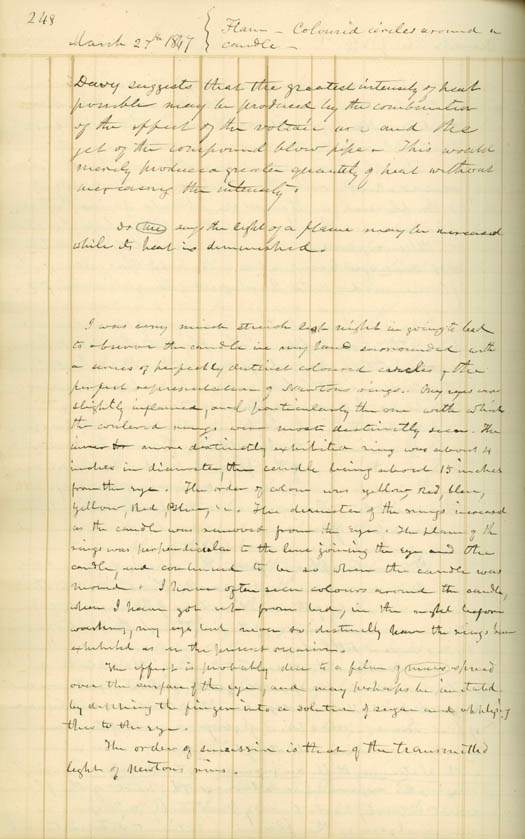|
|
March 27th 1847
Flame--Coloured circles around a candle-- Davy suggests that the greatest intensity of heat
possible may be produced
by the combination of the effect of the voltaic arc and the jet of the
compound blow pipe1--This would merely produce a greater quantity of
heat
without increasing the intensity.
Dr Ure says the light of a flame may be increased while its heat is
diminished.2
I was very much struck last night in going to bed to observe the candle
in my hand surrounded with a series of perfectly distinct coloured
circles--the
perfect representation of Newtons rings.3 My eyes were slightly
inflamed
and particularly the one with which the coulered rings were most
distinctly
seen. The inner &A more distinctly exhibited ring was about
4 inches in diameter the candle being about 15 inches from the
eye.
The order of colour was yellow Red blue Yellow Red Blue &c. The
diameter
of the rings increased as the candle was removed from the eye. The
plane
of the rings was perpendicular to the line joining the eye and the
candle
and continued to be so when the candle was moved. I have often seen
colours
around the candle when I have got up from bed in the night before
washing
my eyes but never so distinctly have the rings been exhibited as on the
present occasion. The effect is probably due to a film of
mucus spread over the surface
of the eye and may perhaps be imitated by dipping the finger into a
Solution
of sugar and applying this to the eye. The order of
succession is that of the transmitted light of Newtons
rin[g]s.Henry Papers, Smithsonian Archives.
1 Humphry Davy, "Some Researches
on
Flame," Phil.
Trans., 1817, p. 74. 2 Andrew Ure (1778-1857) was a consulting chemist
in London. DNB. We
have not identified the source. 3 A reference to Sir Isaac Newton's
discovery that various spectra
in the form of circular rings are produced when light is either
reflected from or transmitted through a thin film of varying thickness.
The order of the colors from reflected light differs from that due to
transmitted light. David Brewster, A Treatise on Optics (London,
1831), pp. 102-103. See also Henry Papers, 3:390; 6:60.
A Altered from or |
|
|


